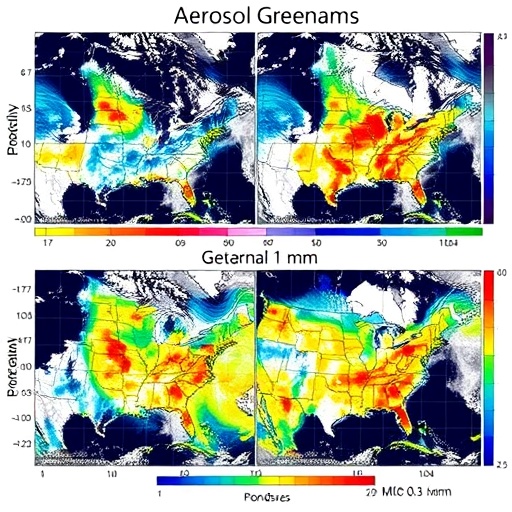In a pioneering study that delves into the intricacies of aerosol retrieval methodologies, researchers M. Anitha and L.S. Kumar have set the stage for a significant contribution to environmental monitoring. Their work, entitled “Performance Assessment of MODIS Dark Target and Deep Blue Aerosol Retrieval Algorithms Using AERONET Observations,” unveils critical insights into aerosol behaviors and retrieval accuracy over diverse geographical regions, namely Jaipur, Karunya University, and broader areas within India. The pressing need for accurate aerosol measurements has grown alongside our understanding of air quality issues and climate change, emphasizing the importance of this groundbreaking research.
Aerosols play a vital role in the Earth’s atmosphere, influencing climate dynamics, air quality, and human health. By scattering and absorbing sunlight, they can either cool or warm the planet, contributing to changes in weather patterns and climate systems. Understanding the properties and distribution of aerosols thus becomes paramount for both climate scientists and policymakers concerned with mitigating the impacts of air pollution. The research team focused on the MODIS (Moderate Resolution Imaging Spectroradiometer) algorithms—specifically the Dark Target and Deep Blue methodologies—two prominent tools used for aerosol retrieval.
MODIS, a key instrument aboard NASA’s Terra and Aqua satellites, has provided continuous data regarding the Earth’s surface and atmospheric parameters. The Dark Target algorithm is designed for retrieving aerosols over dark surfaces, such as oceans and forests, while the Deep Blue algorithm is particularly effective over bright surfaces, such as deserts and urban areas. These retrieval techniques, although distinct in operational mechanics, share the overarching goal of providing accurate aerosol optical depth measurements, which are crucial for understanding atmospheric conditions.
In their comprehensive study, Anitha and Kumar conducted a multidimensional assessment of these retrieval algorithms using AERONET (Aerosol Robotic Network) observations—an authoritative source of ground-based aerosol data. The team meticulously compared MODIS aerosol retrieval results against AERONET data, striving to gauge the accuracy and reliability of satellite-based measurements in different regional contexts. Such assessments are pivotal, as discrepancies between satellite data and ground observations can lead to misinterpretations of atmospheric conditions and erroneous policy-making.
As contributing factors to this assessment, the study scrutinized various environmental parameters including seasonal variations, regional atmospheric conditions, and surface characteristics. By pinpointing how these factors influence retrieval accuracy, the researchers unearthed notable discrepancies in algorithm performance across different geographical landscapes. Their findings reveal nuanced insights into aerosol behavior and signal the necessity for localized calibration of retrieval algorithms, which can significantly enhance the precision of satellite-derived data.
The implications of this research extend beyond mere academic interest. The reliability of MODIS aerosol retrieval algorithms has far-reaching consequences for air quality assessments and climate modeling initiatives. High-accuracy aerosol measurements are crucial for predicting the impacts of aerosols on human health, ecosystem stability, and climate change trajectories. The insights gleaned from Anitha and Kumar’s research could pave the way for improved algorithms that ensure more precise data for both researchers and policymakers.
Furthermore, the effectiveness of the MODIS algorithms is paramount in mitigating air pollution crises that many regions face today. By providing accurate assessments, the algorithms empower governments and organizations to devise targeted interventions aimed at reducing anthropogenic aerosol emissions. Furthermore, in a world increasingly impacted by climate change, understanding aerosol dynamics is essential for predicting future climate scenarios and adapting strategies to manage environmental challenges.
The researchers employed a robust methodology, backed by a vast amount of observational data, which enhances the credibility of their findings. Throughout their investigation, they faced challenges related to cloud cover and aerosol types, both of which can significantly affect retrieval results. By addressing these factors through meticulous data selection and analysis techniques, the researchers demonstrated their commitment to delivering reliable assessments of both MODIS algorithms.
In rendering their findings accessible and actionable, the study serves as a vital resource for the scientific community. It highlights the importance of continued collaboration between satellite remote sensing and ground-based observational networks like AERONET. Such collaborations are essential for enhancing the quality of aerosol data and refining retrieval algorithms, ultimately leading to better-informed conclusions on air quality and climate change.
The research is a clarion call for increased attention to aerosol monitoring. The urgency surrounding air pollution and its effects on public health and our planet cannot be overstated. The advantages of employing accurate satellite retrieval techniques can thus not only help scientists and policymakers but also raise public awareness about the significance of maintaining air quality and environmental health.
This study, therefore, stands as a pivotal piece of research that bridges the gap between satellite data and ground-truth observations. As Anitha and Kumar’s findings resonate within the broader scientific community, it is anticipated that their work will inspire further studies aimed at bolstering aerosol retrieval techniques, enhancing our understanding of atmospheric science, and promoting sustainable environmental policies across the globe.
In conclusion, M. Anitha and L.S. Kumar have authored a crucial research narrative that may redefine aerosol surveillance through MODIS methodologies. Their assessment brings to light the importance of localizing satellite data to improve its accuracy and relevance, which in turn can influence global efforts to combat air pollution and climate change. This work not only serves as a benchmark for future research but also highlights the interconnectedness of satellite technology and ground-based observations in achieving environmental goals.
Subject of Research: Aerosol Retrieval Algorithms Performance Assessment
Article Title: Performance Assessment of MODIS Dark Target and Deep Blue Aerosol Retrieval Algorithms Using AERONET Observations: A Case Study over Jaipur, Karunya University, and Broader Indian Regions.
Article References:
Anitha, M., Kumar, L.S. Performance Assessment of MODIS Dark Target and Deep Blue Aerosol Retrieval Algorithms Using AERONET Observations: A Case Study over Jaipur, Karunya University, and Broader Indian Regions.
Environ Monit Assess 197, 1284 (2025). https://doi.org/10.1007/s10661-025-14653-8
Image Credits: AI Generated
DOI:
Keywords: Aerosols, MODIS, Satellite Retrieval, Environmental Monitoring, AERONET




